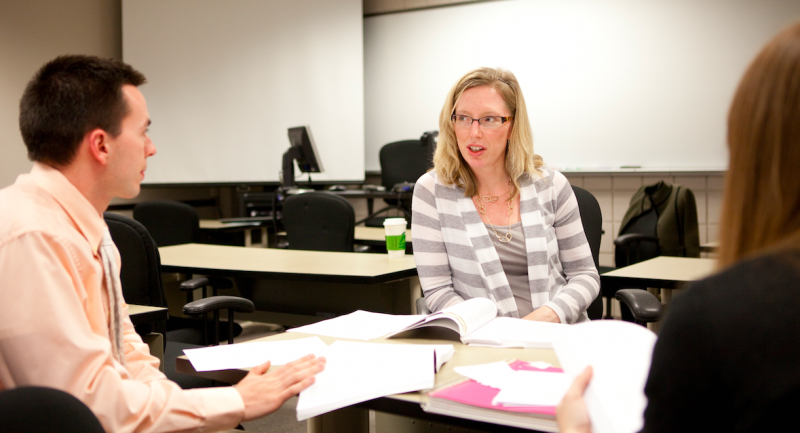New book explores challenges millennials face as new educators in 'uncertain times'

Much has been made of millennials, their life experience, how they view the world and how they learn. But what about those who are beginning their careers as educators, teaching the next generation? A University of Kansas professor has written a book about their experiences, challenges, identities and how they can adapt.
Heidi Hallman, associate professor of curriculum and teaching, wrote "Millennial Teachers: Teaching in Uncertain Times." The book details the experiences of five new teachers, all members of the Millennial generation and how the traits of their generation play out in their early careers as teachers.
"I wanted to look more at how those traits commonly associated with millennials are manifested by these new teachers and how they tackle issues in their schools," Hallman said. "I never tire of working with beginning teachers. It's always been one of my passions."
Specifically, the book explores how the themes of globalization and uncertain times affect new teachers. By the latter, Hallman refers to an era in which the role of the teacher and accessibility of knowledge has changed. Where formerly teachers often had specialties or "knowledge domains," there is now more interdisciplinary teaching and less rigidity in what teachers are expected to know. The rise of technology has also made information from unlimited sources available at all times, meaning the educator is no longer the sole source of information for young learners.
The teachers detailed in the book shared their experiences in dealing with these realities early in their careers. Specifically, technology challenged what many of them thought their roles as teachers would be. Many schools are implementing "one to one initiatives" or policies that dictate every student will have one computer or device available in school. There are unlimited ways to implement such policies, and different teachers are finding varying levels of success doing so while still managing to deliver their curriculum.
A few of the book's profiled teachers enjoyed the experience and potential, but others said it felt more like a management project than learning opportunity or that it changed the role of the teacher, making them the expert on a subject or determining if students found the "one right answer" online, instead of someone who encouraged young people to be knowledge seekers.
Hallman also explores standardization and how it influences the work of new teachers. Millennials were educated in the era of increased standardization, and much importance is still placed on test results.
"I think a lot of people are attracted to teaching because there's a lot of freedom and room for creativity. But a lot of new teachers have said they felt kind of trapped by that standardization," Hallman said.
It is common for young people to be idealistic and want to change things for the better, and millennial teachers are no different. Hallman writes about how new teachers reported they want to challenge standardization and that those who will most likely be successful in the field are those who are able to compromise. Given their newness in the field, millennial teachers aren't as prone to view an era of education as good or bad, but simply that things are done a certain way now and that through compromise they can find meaningful ways to do what they love while still meeting requirements such as standardization. Hallman has seen students adapt in their first few years on the job.
"I felt like, seeing these students and their ability to adapt, it gave me confidence that they'll be able to go into schools and successfully become the next generation of educators," Hallman said.
They quickly get past the idea that teaching is only about content knowledge, she said.
"Millennial Teachers" also explores diversity and social justice and how it fits in today's schools. The teachers profiled showed a dedication to considering the importance of inclusion and understanding how different life experiences will play into classroom dynamics as well as how each student learns. While the stereotype is that millennials want things to be tailored specifically to them, the book shows the young teachers realize that issues of race, class, gender and other experiences need to be addressed in school.
"I think millennials are more confident in being able to navigate the terrain as they go. I found they were very resourceful in thinking about how their own experience may be different than the kids they'll see in their schools," Hallman said.
As more millennials transition from the role of student to teacher, Hallman said she hopes they will be able to be flexible and reconcile the differences between their expectations and the reality they find in their schools. The book, dedicated to millennial teachers, will help shed light on the experiences of new educators and how their identities as teachers can help them succeed as educators, even in uncertain times.
Provided by University of Kansas


















